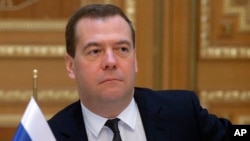Russia's Prime Minister, Dmitri Medvedev, announced a halt to a proposed ban on state-funding of imported medical goods.
Medvedev told Russian journalists a suggested bill to restrict imported medical devices and supplies would not be supported by his government unless treatment quality for patients could be maintained.
"I have stopped the document [bill] so far,” he said. The prime minister added, “we must be 100 percent sure that if we close the supply of something, we produce similar products that are not worse.”
Russia's Industry and Trade Ministry in August had urged the ban on some 100 imported medical devices and supplies as part of the government's efforts at “import substitution.” It would have prevented state hospitals and clinics from buying the imports, although private stores could still sell them.
The list of items suggested for the ban included everything from X-ray machines, defibrillators, incubators for newborns and prosthetic devices to crutches, bandages and condoms.
Medical Community Critical
Russia's medical community criticized the proposal for failing to first consult doctors and medical experts as Russian producers can not make the same quality of products or do not make them at all.
Russia's International Medical Device Manufacturers Association (IMEDA) welcomed Medvedev's decision.
In a written response to questions from VOA's Moscow Bureau, IMEDA said:
"We consider the decision a correct one and very much on time as we have the same opinion as Mr. Medvedev.” The statement went on to add, “before increasing the list of banned items, each one should be agreed upon with the medical community, as only the doctor who uses this or that medical item could give a confident reply whether we are ready to replace this imported item or not."
Concerns - Serious and Otherwise
The idea of banning imported condoms, in particular, had sparked a wave of ridicule in social media on Russian prophylactics. One joke circulating read, “If you see smoke and smell burning rubber, don't call the fire department. It's probably just your neighbors using Russian condoms.”
But there were more serious medical concerns as, for example, imported bandages specially used to treat pediatric skin disease that would have been blocked.
A group of Russian medical organizations had sent a letter to Medvedev urging him not to allow the proposed ban because of the effect on quality of state medical care.
Russia's health care sector has taken a beating in recent years as reforms have threatened to close hospitals and cut jobs. Thousands of health care workers last year protested the reforms in Moscow's streets.
Import Substitution Policy
Russia's “import substitution” policy aims to encourage Russia's domestic producers to develop supplies for markets now dependent on foreign imports. It was accelerated after western sanctions were put in place following Russia's annexation of Crimea in neighboring Ukraine in 2014.
The policy has seen bans on imports of western foods, including European cheese and meat, that have harmed Europe's farmers.
Russian authorities this summer dramatically destroyed thousands of tons of smuggled western foods in images played out on national television.
The destruction was criticized as a waste when millions of Russians live below the poverty line and are struggling to get by in Russia's shrinking economy.
Medvedev in August extended the ban on food imports for another year and added Albania, Iceland, Liechtenstein, and Montenegro to the ban list.
He also threatened to add Ukraine to the list in 2016 if Kyiv completes a trade agreement with the European Union.










